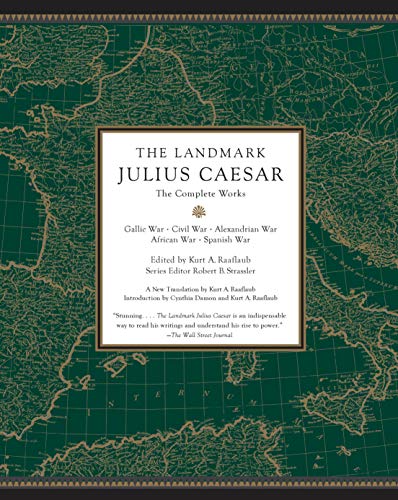The Landmark Julius Caesar: The Complete Works: Gallic War, Civil War, Alexandrian War, African War, and Spanish War (Landmark Series)
₱2,332.00
Review
“Stunning. . . . Mr. Raaflaub has surpassed even the previous high standards of the Landmark series by supplying full, expert and wide-ranging notes, almost all containing his own elucidations rather than showy scholarly references. This achievement is amplified by more than 40 appendix essays, all commissioned by Mr. Raaflaub and several written by him, addressing all sorts of literary, military and biographical questions. . . . History buffs, classicists, fans of television’s
Rome: Do not pass up this gift. Whether you revere Caesar as a military genius or despise him as a butcher and a tyrant,
The Landmark Julius Caesar is an indispensable way to read his writings and understand his rise to power.”
—James Romm, The Wall Street Journal“Splendid. . . . A boon for every student. . . . A distinguished historian and classicist, Raaflaub offers an excellent translation.”
—The New Criterion
“Glorious. . . .
The Landmark Julius Caesar is a superb addition to a superb series.”
—The National
About the Author
KURT A. RAAFLAUB completed his Ph.D. in Switzerland, served eight years as co-director of the Center for Hellenic Studies in Washington, D.C., and is now professor emeritus of classics and history at Brown University. His main fields of study are the social and political history of the Roman republic; the social, political, and intellectual history of archaic and classical Greece; and comparative history of the ancient world.
ROBERT B. STRASSLER is an unaffiliated scholar who holds an honorary Doctorate of Humanities and Letters from Bard College and is chairman of the Aston Magna Foundation for Music and the Humanities. He lives in Brookline, Massachusetts.
Excerpt. © Reprinted by permission. All rights reserved.
GALLIC WAR I
Gaul, if you take all of it into account, is divided into three regions.The Belgae live in one, the Aquitani in the second, and in the third a people called Celts in their own language but Gauls in ours.[2] These three peoples are all different from one another in their languages, institutions, and laws. The Garumna River separates the Aquitani from the Gauls, and the Matrona and Sequana Rivers separate the Gauls from the Belgae.[3] Of all these groups, the most warlike are the Belgae, because they are the farthest from the civilized sophistication of the Province;merchants come to them least often with imports that foster an effeminate disposition;they are also the closest to the Germans living across the Rhine River, and they are constantly at war with them. [4] This is, moreover, the reason the Helvetiisurpass all the Gauls except the Belgae in bravery: they struggle with the Germans in almost daily battles, either trying to keep them out of their own country or else actually waging war in the Germans’ territory. [5] [The region that, as stated above, the Gauls occupy starts at the Rhône River, and its other boundaries are the Garumna River, the Atlantic Ocean, and the territory of the Belgae. One part of it, where the Sequani and the Helvetii are found, touches the Rhine River. But its general direction is to the north. [6] The Belgae are found starting from the farthest borders of the Gauls, and then all of the way to the lower part of the Rhine, in a region verging toward the north and east.[7] Aquitania goes from the Garumna River to the Pyrenees Mountains and the part of the Atlantic Ocean next to Spain.It stretches northwest from the Province.] [1] Among the Helvetii, by far the most noble and wealthy person was Orgetorix.In the consulship of Marcus Messalla and Marcus Piso, he was tempted by desire for kingship to conspire with the aristocracy, and he persuaded his nation to leave their own territory with all their forces.[2] He told them that, because they excelled above all others in bravery, it would be very easy to take over the whole of Gaul and rule it.[3] What helped to persuade them was that the Helvetii are closed in on all sides by natural boundaries. On one side

₱2,332.00











